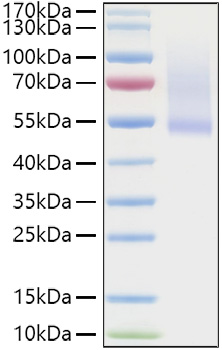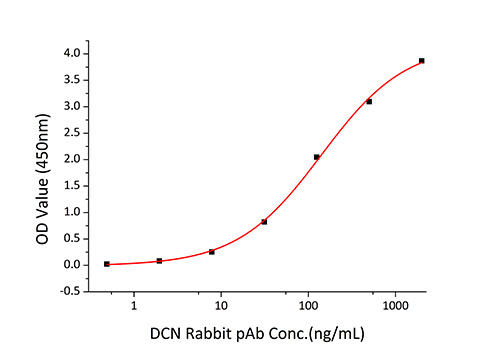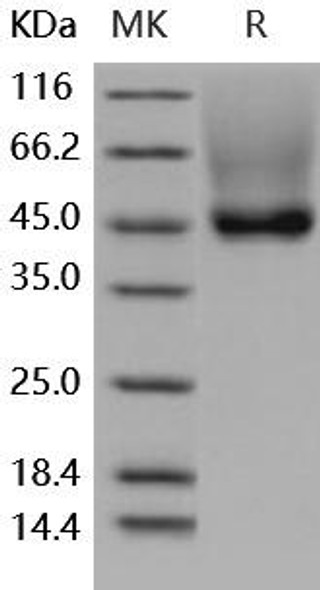Description
Recombinant Human Decorin/PG-S2/DCN Protein
The Recombinant Human Decorin/PG-S2/DCN Protein is a biologically active recombinant protein that plays a significant role in various cellular processes and signaling pathways in human biology. This protein is widely employed in immunological research, cell biology studies, protein-protein interaction analyses, and therapeutic development, providing researchers with a reliable tool for investigating Decorin/PG-S2/DCN function and its implications in health and disease.
This product (SKU: RPCB0895) is produced using HEK293 cells and features a C-His tag for convenient detection and purification. The protein exhibits a calculated molecular weight of 38.83 kDa with an observed molecular weight of 45 kDa under denaturing conditions, achieving ≥ 95 % as determined by SDS-PAGE.. Functional bioactivity has been validated through rigorous quality control assays, confirming its suitability for demanding research applications.
Key Features
| High Purity by Affinity Chromatography | |
| Mammalian & Bacterial Expression Systems | |
| High lot-to-lot consistency via strict QC |
| Product Name: | Recombinant Human Decorin/PG-S2/DCN Protein |
| SKU: | RPCB0895 |
| Size: | 10 μg , 20 μg , 50 μg |
| Reactivity: | Human |
| Synonyms: | DCN, CSCD, DSPG2, PG40, PGII, PGS2, SLRR1B, decorin, Decorin |
| Tag: | C-His |
| Expression Host: | HEK293 cells |
| Calculated MW: | 38.83 kDa |
| Observed MW: | 45 kDa |
| Gene ID: | 1634 |
| Protein Description: | High quality, high purity and low endotoxin recombinant Recombinant Human Decorin/PG-S2/DCN Protein (RPCB0895), tested reactivity in HEK293 cells and has been validated in SDS-PAGE.100% guaranteed. |
| Endotoxin: | Please contact us for more information. |
| Purity: | ≥ 95 % as determined by SDS-PAGE. |
| Formulation: | Lyophilized from a 0.22 μm filtered solution of PBS, pH 7.4. |
| Bio-Activity: | Measured by its binding ability in a functional ELISA. Immobilized Human DCN at 1 μg/mL (100 μL/well) can bind DCN Rabbit pAb with a linear range of 0.5-141 ng/mL. |
| Reconstitution: | Centrifuge the vial before opening. Reconstitute to a concentration of 0.1-0.5 mg/mL in sterile distilled water. Avoid vortex or vigorously pipetting the protein. For long term storage, it is recommended to add a carrier protein or stablizer (e.g. 0.1% BSA, 5% HSA, 10% FBS or 5% Trehalose), and aliquot the reconstituted protein solution to minimize free-thaw cycles. |
| Storage: | Store at -20℃.Store the lyophilized protein at -20℃ to -80 ℃ up to 1 year from the date of receipt. After reconstitution, the protein solution is stable at -20℃ for 3 months, at 2-8℃ for up to 1 week. |
Decorin is a ubiquitous small cellular or pericellular matrix proteoglycan and is closely related in structure to biglycan protein. It belongs to the small leucine-rich proteoglycan (SLRP) family and consists of a core protein and a covalently linked glycosaminoglycan chain which is either chondroitin sulfate (CS) or dermatan sulfate (DS). As a component of connective tissue, decorin interacts with several extracellular matrix components, such as type I collagen and fibronectin, and plays a role in matrix assembly. Decorin resides in the tumor microenvironment and affects the biology of various types of cancer by downregulating the activity of several receptors involved in cell growth and survival. Decorin binds to and modulates the signaling of the epidermal growth factor receptor and other members of the ErbB family of receptor tyrosine kinases. It exerts its antitumor activity by a dual mechanism: via inhibition of these key receptors through their physical downregulation coupled with attenuation of their signaling, and by binding to and sequestering TGFbeta. Decorin also modulates the insulin-like growth factor receptor and the low-density lipoprotein receptor-related protein 1, which indirectly affects the TGFbeta receptor pathway. Decorin plays significant roles in tissue development and assembly, as well as playing both direct and indirect signaling roles.








